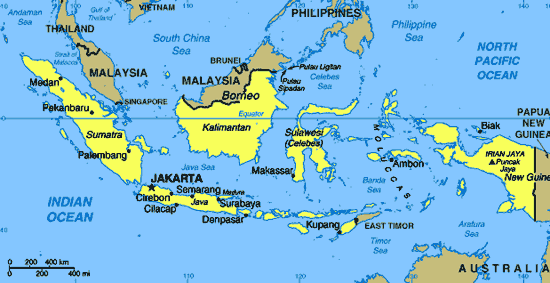Indonesian President Joko Widodo would like to move the capital of Indonesia-Jakarta-due to climate change and floods.
Bambang Brodjonegoro an Indonesian Minister declared in front of the Jakarta Globe that the other Indonesian ministers are invited to propose other alternatives:"We want a new city, which reflects not only Indonesia's identity, a modern world-class city, or a smart, green and beautiful city," he told
The capital of the largest archipelago in the world, sags extremely, in 10 years Jakarta sank about 2.5m, according to many research in a couple of years some parties in the city will be completely submerged with water.
The new capital will potentially be located in the center of the country, the cities of Sulawesi and Palangkaraya have been proposed by Brodjonegoro: "It would be central from west to east or from north to south" he added: "Represent justice and encourage the especially in eastern Indonesia ".
Indonesia has planned to move its capital since the 1940s, but this project didn’t succeed prompting many to think that this move would never happen.
However, if the project is successful, the move should take more than 10 years.
Indonesia is not the only country wishing to move its capital, indeed in 1961 Brazil moved its capital to Brasilia and Egypt is currently building its new capital next to its original capital, Cairo.
-Leyna
https://www.dezeen.com/2019/05/01/indonesia-new-capital-city-jakarta-sinking/
Un changement capital
Le président indonésien, Joko Widodo, souhaiterait déplacer la capitale de l’Indonésie –Jakarta- en raison du changement climatique et des risques d’inondation.
Le Ministre du Plan de Développement Bambang Brodjonegoro a déclaré que les autres ministres étaientinvités à proposer d’autres alternatives :"Nous voulons une nouvelle ville, qui reflète non seulement l'identité de l'Indonésie, soit une ville moderne de classe internationale, ou une ville intelligente, verte et belle", a-t-il déclaré au site de presse The Jakarta Globe.
La capitale du plus grand archipel au monde s’est affaissée dangereusement, d’environ 2,5m en 10 ans, d’après de nombreuses recherches certaines partis de la ville serai complètement submerger d’eau.
La nouvelle capitale se situera potentiellement au centre du pays, les villes de Sulawesi et Palangkaraya ont été proposées par Brodjonegoro :"Ce serait central d'ouest en est ou du nord au sud et celareprésenterait la justice et encouragerait le développement, en particulier dans l'est de l'Indonésie".L’Indonésie projette de déplacer sa capitale depuis les années 1940, mais cette idée n’a pas abouti et de nombreuses personnes pensaient que ce déménagement n’aurait jamais lieu.

Cependant si le projet aboutit, le déménagement devrait prendre plus de 10ans.
L’Indonésie n’est pas le seul pays souhaitant déplacer sa capitale, en effet en 1961 le Brésil a déménagé la sienne à Brasilia, l’Egypte est actuellement en train de construire sa nouvelle capitale à côté du Caire, sa capitale actuelle.
-Leyna
https://www.dezeen.com/2019/05/01/indonesia-new-capital-city-jakarta-sinking/


